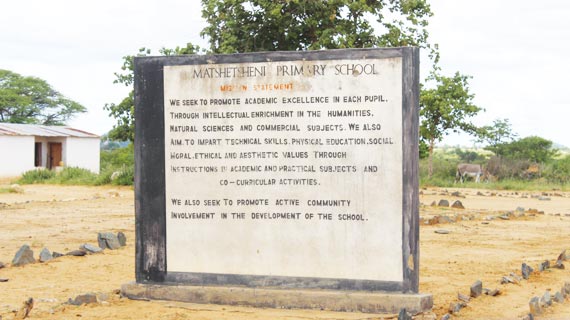
Matshetsheni Primary School, about 22km from Gwanda town in Matabeleland South, boldly showcases its mission statement at its gates.
NDUDUZO TSHUMA STAFF REPORTER
“We seek to promote academic excellence in each pupil through intellectual enrichment in the humanities, natural science and commercial subjects.
“We also aim to impart technical skills, physical education, social, moral, ethical and aesthetic values through instructions in academic and practical subjects and curricular activities.
“We also seek to promote, achieve community involvement in the development of the school.”
But the 2013 Grade 7 final examination results show the school has fallen far short of its high sounding goals. It is one of six institutions in the province that failed to have a single student passing their Grade 7 examinations.
On arrival at the school, this reporter was ushered to the headmaster’s office, which told the whole story. A chair, school dining hall table and a long bench completed the furniture in the headmaster’s office.
- Chamisa under fire over US$120K donation
- Mavhunga puts DeMbare into Chibuku quarterfinals
- Pension funds bet on Cabora Bassa oilfields
- Councils defy govt fire tender directive
Keep Reading
The school has seven classrooms and another without a roof, the football pitch opposite the facility has tall grass, with no sign of a running track.
Glass Block 2 Primary School, 22km from Filabusi is in a similar predicament, although it has better infrastructure than Matshetsheni. Officials at both schools declined to comment on their poor results citing government protocol.
However, a parent at Glass Block 2, Dumisani Mlilo said some children walked as far as 7km to the school.
“The drought that affected the southern parts of the country affected the schools mostly in the rural areas,” he said.
“Some of the children had to travel for about 7km to school with nothing on their stomachs.Some even abandoned school.”
The investigations have revealed that this is common in the Matabeleland region and actually there had been a significant improvement last year.
There was an uproar last week following revelations that six Gwanda schools, Gobadema, Glass Block 2, Ngoma, Matshetsheni, Tshongwe and Zelezele, had no single student passing last year had recorded 0% pass rates.
Despite last week’s outcry over schools that recorded 0% pass rates in Grade 7 examinations, this was an improvement from last year, where 16 schools had failed to record a single pass.
In Beitbridge Jalukange, Malabe, Zhompembe and Mapai failed to produce a student who proceeded to Form 1 this year.
However, the figure represented a marked improvement from last year where 11 schools had no single student passing, according to figures obtained by Southern Eye.
The Zimbabwe Schools Examination Council (Zimsec) last week demanded $ 1 200 from Southern Eye for an analysis of last year’s Grade 7 examinations.
A concerned parent said the results reflected the sorry state of education in the region.
“Although there was a slight improvement over the 2012 results, the 2013 results are still a disaster for our region because they mean that 79% of our very young children have come to the end of their education, yet they can barely read and write,” he said.
“The situation is the same from Beitbridge to Binga and Plumtree to Victoria Falls.
“When we are dead. Our children will be justified to kick our graves because we did nothing to improve their chances to compete on an equal basis with children from other regions of the country.”
Veteran educationist and former Gwanda South legislator, Thandeko Zinti Mnkandla blamed the situation on the poor learning environment in most schools in the region.
“The teachers, including education officials, pupils and the parents all contribute to the outcome of the results,” he said.
“There is need for a creation of an environment for the pupil to produce better results, for there to be good results, the three need to work in tandem.
“If any slackens then failure is guaranteed. Parents must make sure they give their children the best in terms of resources and study time. Children must not have divided focus.”
Mnkandla said even the poor should make sure that they give their best and motivate their children to escape poverty.
“The teacher, besides issues of salaries, must have a natural liking for the children,” the former Gwanda Zintec principal said.
“They should treat them like their own. There is also an issue of under qualified teachers that has an effect on the results. The education officers need to be strict on their monitoring of teacher performance. The accessibility also perhaps is used as an excuse by education officers and if you investigate you would discover that some schools have not been monitored in many years.”
He said the issue of poor salaries prevented teachers from fully applying themselves in their jobs resulting in absenteeism from both educators and pupils.
“Most of the children in these rural areas live with grandparents as their parents are either outside the country or have passed away,” he said.
“There is no push from the biological parents on the pupils to perform better.”
An Education ministry official who spoke on condition of anonymity echoed Mnkandla’s sentiments, adding that there was need to employ locals in education offices, who would appreciate things happening on the ground.
“There is the issue of infrastructure. Zelezele for instance, had roofs blown away in some classes by strong winds last year and to date the roofs have not been replaced,” the official said.
Prominent historian and former Matabeleland North provincial education director, Phathisa Nyathi said the poor results came as no surprise as most people seemed not to value education.
“Does it come as a surprise? To me it is not a surprise because people are leaving Zimbabwe to South Africa or Botswana for greener pastures,” he said.
“It is the problem of our own creation not lack of intelligence and we are marginalising ourselves.
“If we fail to change this mentality we are going to cry. People must learn to provide for themselves in their own country.”
Matabeleland South provincial education director Tumisang Thabela said she could not comment because she was on leave.














